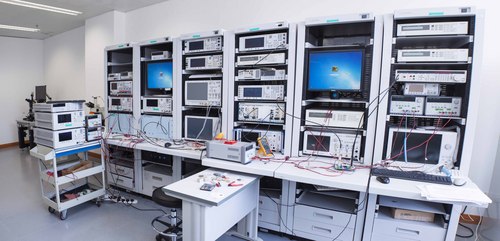 Chips developed by UM’s PhD students have reached world-class standards
Chips developed by UM’s PhD students have reached world-class standards
Four PhD students from the University of Macau’s (UM) State-Key Laboratory of Analog and Mixed-Signal VLSI (AMSV) and Faculty of Science and Technology’s Department of Electrical and Computer Engineering (ECE), recently passed their oral defenses with flying colours. Their PhD dissertations, which discuss how to significantly reduce power consumption and increase the speed of production for wireless communication circuits at a lower cost, were praised by the Examination Committee, composed of professors from the University of Pavia in Italy and the South China University of Technology, for reaching world-class standards.
The four PhD students are Yu Weihan, Cheang Chak Fong, Qi Gengzhen, and Peng Xingqiang. Yu, Qi and Peng completed their bachelor’s, master’s, and PhD studies at UM. Dr Yu and Dr Cheang graduated from Macau Yuet Wah College, and Macau Instituto Salesiano, respectively. Both Dr Yu and Dr Cheang received the Macao Science and Technology Award for Postgraduates from the Science and Technology Development Fund in 2016. Dr Yu also received the 2017-2018 Predoctoral Achievement Award from the IEEE Solid-State Circuits Society (SSCS). Dr Qi’s PhD work was partially developed during his internship in Imec, Belgium. Imec is an international hub for innovation and R&D activities, particularly in the fields of nanoelectronics and digital technologies. Dr Peng’s family was among the victims of the Sichuan earthquake in 2008, when he was just starting his bachelor’s studies at UM. Over the past nine years at UM, he has proven himself capable of solving world-class problems. Two of them have already joined leading chip manufacturers in the world, while the other two will continue their research projects.
Their papers are titled ‘Power-Efficient and Wideband WLAN Transmitter Techniques in Nanoscale CMOS’, ‘Digital Correction Techniques for I/Q Mismatch, LO Feedthrough and Distortion in Wideband Transmitters’, ‘SAW-Less Multiband TDD/FDD Transceiver Front-Ends Using Gain-Boosted N-path Techniques’, and ‘Ultra-Low-Power Wireless Transmitter Circuit Techniques for Internet-of-Things Applications’, respectively. All the four theses are related to the hardware development of wireless communication chips for the next-generation cellular, Wi-Fi, and Internet-of-Things (IoT) standards. The four students were supervised by Prof Elvis Mak Pui In, associate director (research) of the lab. Cheang, Yu, and Qi were co-supervised by Prof Mak and Prof Rui Martins, vice rector (research) of UM. Peng was co-supervised by Prof Mak and Dr Yin Jun, assistant professor from AMSV. The four dissertations together have generated a number of world-class papers, including three papers in the Institute of Electrical and Electronics Engineers (IEEE) Journal of Solid-State Circuits (JSSC), six papers in the IEEE Transactions on Circuits and Systems (TCAS-I/II), two papers and two student previews at the IEEE International Solid-State Circuits Conference (ISSCC), and one paper at the IEEE Radio Frequency Integrated Circuits Symposium (RFIC).


